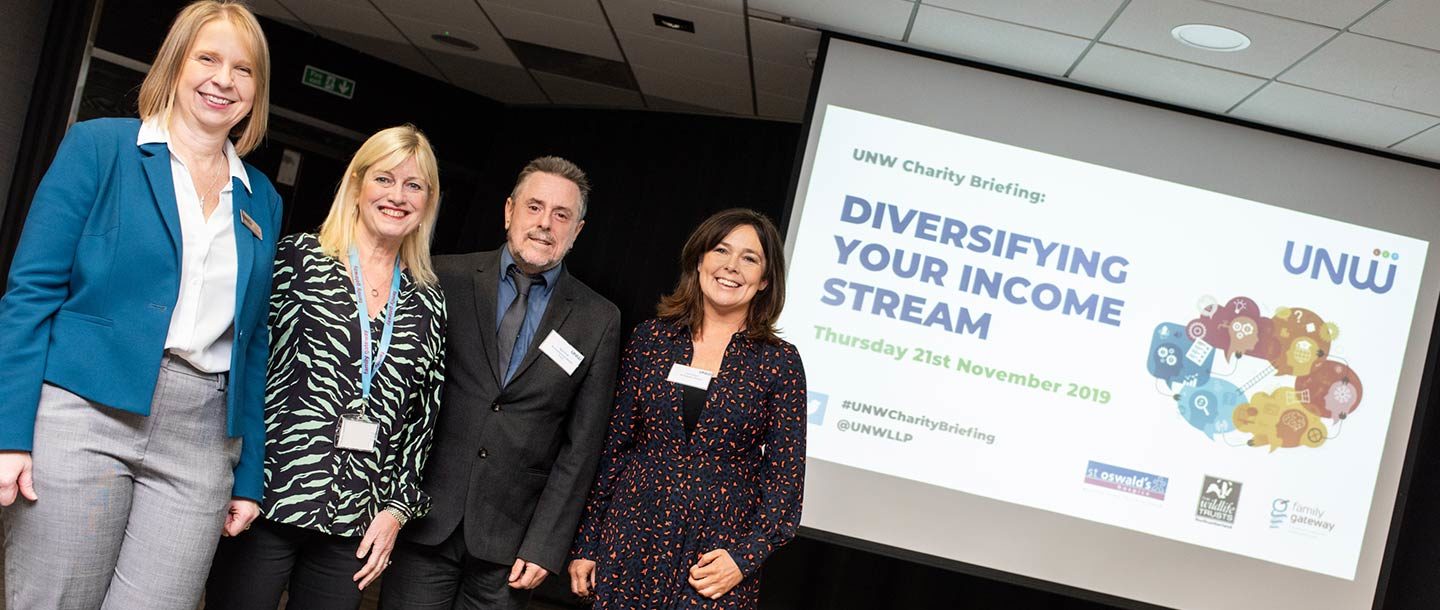In recent years, many charity and not-for-profit organisations have seen their traditional trading source of grant and statutory funding reduce.
On 21st November 2019, UNW’s final Charity Briefing of the year brought together three experienced individuals to provide insight on how their organisations have utilised their assets, explored new opportunities, and innovated to boost income generation through sales or activities.
Over 70 representatives from charities and not-for-profit organisations attended the event at Heroes Suite in St. James’ Park. They were joined by guest speakers Jane Hogan, Head of Fundraising at St. Oswald’s Hospice, Mike Pratt, Chief Executive Officer at Northumberland Wildlife Trust, and Pauline Wonders, Strategic Director at Family Gateway. All three speakers shared the methods utilised by their organisations to diversify income streams and build support by engaging with wider audiences.
One of the main topics discussed was the need for charitable organisations to look inwards and identify opportunities to utilise their current assets. This was demonstrated by Northumberland Wildlife Trust, which built its first ever visitor centre in the space where its education hub had been lost due to a fire. Turning a negative situation into a positive outcome, the Trust engaged 100 local community volunteers to help build the centre. These volunteers then became ambassadors for the Trust’s charitable mission and personally welcomed visitors through the doors.
More than 70,000 people visited the centre in the first year – more than double what the Trust had expected. A café was opened within the centre in order to weave the income stream directly into the building, helping to drive attendance and engage with new audiences. The organisation also started offering merchandise and membership to encourage return visits, alongside charging for car parking.
Mike was keen to point out that by educating younger audiences, the Trust has also created an “organic, evolving membership” that has helped them manage the centre sustainably. He also stated that building it has given the organisation confidence to take other calculated risks, which has attracted new major donors for a wide range of projects and even core funding.
The need for charities and not-for-profit organisations to remain focused on their mission and core values whilst trying to diversify income was also discussed. While stating that they are “at the start of their diversification dilemma,” Pauline highlighted that Family Gateway’s main priority has always been to deliver impact in line with their charitable objectives and provide jobs for their service users through diversification.
Family Gateway launched its “Community and Family Enterprise” programme in 2018, which offers training and employment opportunities to parents who have experienced poverty by developing a number of new social enterprises that would offer supported employment to local people.
The new direction for the charity sees a number of new activities and trading enterprises develop income streams to support the core charity work of working in disadvantaged communities to engage with vulnerable families, who would otherwise not receive the support they needed. By focusing on its core mission, Family Gateway has delivered impact through its diversification by creating more than 20 jobs for vulnerable people.
Providing insight into the process behind the charity’s highly publicised large-scale art trails in 2016 and 2019, Jane discussed how the charity was able to engage with mass audience of both the public as well as the business community. Through this year’s ‘Elmer’s Great North Parade’ trail, a strong message was developed to connect the hospice directly to the campaign, through a substantial social media presence and eleven different events.
Jane then suggested that there is a risk in “diversifying away from your core audience.” She recommended that when diversifying, charities need to remember to continue to engage and give attention to their unconditional supporters – those who will “show up for the charity whatever the weather.”
All three speakers noted that there is an element of risk associated with diversifying income. In order to minimise this risk, it is essential to be clear about both why and how you plan to diversify, and ensure that you have the support of your board and the relevant skill-sets involved with the project, whatever its size and scale.
For more information about UNW’s Events Programme, please contact Maxine Fox via events@unw.co.uk. If you would like to know more about our charity expertise, please contact Anne Hallowell, Charity and Not-for-Profit partner, via annehallowell@unw.co.uk.

